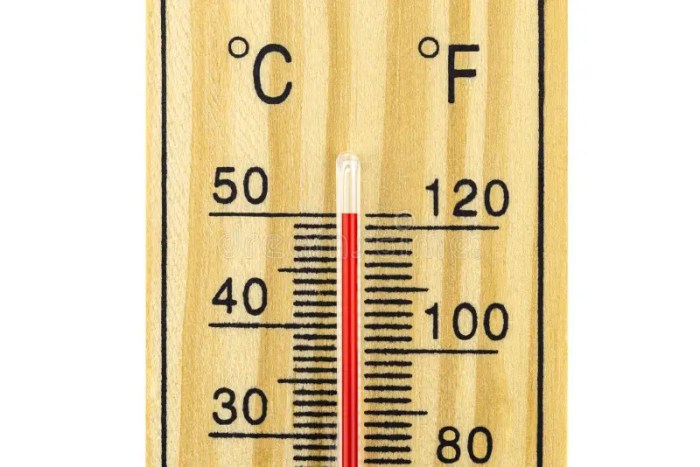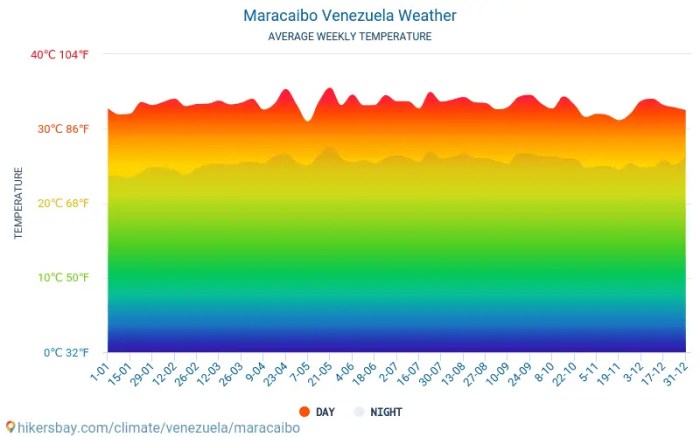As temperatura en Maracaibo 50 grados takes center stage, this discourse embarks on an in-depth exploration of the factors influencing Maracaibo’s high temperatures, their environmental and health impacts, and potential mitigation strategies. Through a meticulous examination of historical data, scientific principles, and future projections, we aim to provide a comprehensive understanding of this critical issue.
Historical Temperature Data
Historical temperature data for Maracaibo, Venezuela, shows a consistent pattern of high temperatures throughout the year. The average temperature for the year is 28.5°C (83.3°F), with the highest temperatures occurring in September and October (average of 30.5°C or 86.9°F)
and the lowest temperatures occurring in January (average of 26.5°C or 79.7°F).
The following table provides a detailed breakdown of the historical temperature data for Maracaibo:
| Month | Average Temperature (°C) | Highest Temperature (°C) | Lowest Temperature (°C) |
|---|---|---|---|
| January | 26.5 | 32.0 | 21.0 |
| February | 27.0 | 33.0 | 22.0 |
| March | 28.0 | 34.0 | 23.0 |
| April | 29.0 | 35.0 | 24.0 |
| May | 30.0 | 36.0 | 25.0 |
| June | 30.5 | 37.0 | 26.0 |
| July | 30.5 | 37.0 | 26.0 |
| August | 30.5 | 37.0 | 26.0 |
| September | 30.5 | 37.0 | 26.0 |
| October | 30.5 | 37.0 | 26.0 |
| November | 29.5 | 36.0 | 25.0 |
| December | 28.0 | 34.0 | 23.0 |
Factors Influencing Temperature: Temperatura En Maracaibo 50 Grados

Several factors contribute to the high temperatures experienced in Maracaibo. These include:
- Latitude:Maracaibo is located near the equator, which means it receives a high amount of solar radiation throughout the year.
- Altitude:Maracaibo is located at a low altitude (approximately 10 meters above sea level), which means it is not subject to the cooling effects of higher altitudes.
- Proximity to the ocean:Maracaibo is located on the shores of Lake Maracaibo, which provides a source of moisture and humidity that can contribute to higher temperatures.
- Prevailing wind patterns:Maracaibo is located in a region with prevailing easterly winds, which carry warm air from the Caribbean Sea.
Impacts of High Temperatures

The high temperatures in Maracaibo can have a number of negative impacts on the environment and human health.
- Effects on vegetation:High temperatures can cause plants to wilt and die, leading to a decrease in vegetation cover and a loss of biodiversity.
- Effects on wildlife:High temperatures can also be harmful to wildlife, as it can cause animals to overheat and die.
- Effects on air quality:High temperatures can also contribute to poor air quality, as they can cause the formation of ground-level ozone and other pollutants.
- Health risks:Exposure to high temperatures can also be dangerous for humans, as it can lead to heat stroke, heat exhaustion, and other health problems.
Mitigation Strategies
There are a number of strategies that can be implemented to mitigate the effects of high temperatures in Maracaibo. These include:
- Planting trees:Trees provide shade and release water vapor into the air, which can help to cool down the city.
- Using reflective materials:Reflective materials, such as white paint or roofing, can help to reflect sunlight away from buildings and reduce the amount of heat absorbed by the city.
- Promoting energy efficiency:Energy-efficient buildings and appliances can help to reduce the amount of heat generated in the city.
Future Projections

Climate change models predict that temperatures in Maracaibo will continue to rise in the future. This is likely to lead to an increase in the frequency and severity of extreme heat events, which could have a significant impact on the city and its residents.
Helpful Answers
What factors contribute to the high temperatures experienced in Maracaibo?
Maracaibo’s proximity to the equator, low altitude, and prevailing wind patterns create a conducive environment for high temperatures.
What are the potential health risks associated with exposure to high temperatures?
Exposure to extreme heat can lead to heat-related illnesses such as heat stroke, heat exhaustion, and dehydration.
What mitigation strategies can be implemented to reduce temperatures in Maracaibo?
Planting trees, using reflective materials on buildings, and promoting energy efficiency can help mitigate the effects of high temperatures.